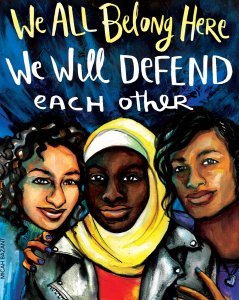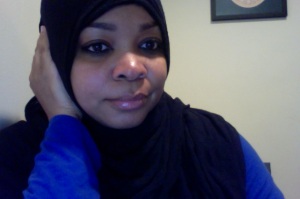
Intisar Shah is one of the most recognisable and respected members of the Philadelphia Muslim community. Born and raised in North Philadelphia, she accepted Islam in 1973. Some people have described Intisar Shah as a rock of the community, but she is more than that; she’s a gemstone who has been polished through perseverance, faith, and dedication to her community.
While small in stature, sister Intisar has a calm and commanding presence that is respected by everyone. Qasim Rashad highlights Intisar’s positive attitude, explaining, “She has an ability to make you feel the world cares about you while at the same time she is as candid and truthful as they come.” Perhaps it’s her mid-Atlantic dialect, with traces of Southern warmth, or that Philly swagger, which transcends age, that makes it so easy for people of all ages to relate to her. She acknowledges, “I work with both ends, the youth and elders, and the adults in between.”
For over 40 years, sister Intisar has worked with inner city youth. Keziah Ridgeway, educator, writer, and Philly fashionista, relates, “I still remember her work with the youth back when I was in high school and it doesn’t seem that she’s slowed down one bit as she grows older.” Intisar lives just one block from United Muslim Masjid in South Philadelphia, one of the city’s most active Muslim communities. Qasim Rashad, Amir of United Muslim Masjid, notes, “Everyone that knows sister Intisar knows she loves her community, her people and the youth.” She considers the Muslim community her family and the masajid across Philadelphia home. Intisar recounted her youth, “I came from a family of very motivated leaders. My mother fought for community rights and a clean neighbourhood. She always had an extra plate at the table for a stranger, for anyone that may drop by.” Intisar’s most meaningful work is linked to turning personal tragedy into blessings for the youth and Philadelphia Muslim community as a whole.
One of the great testaments to her faith and dedication to Islamic education is the life of her son, Qa’id Ameer Abdul-Majeed Staten. Like his mother and father, Sam Staten Sr., Qa’id devoted much of his time to volunteering in the community. Despite his youth, Qa’id inspired others around him and even began his own organisation. When I asked her what the key was to raising such a devout, thoughtful, and inspirational young man, Intisar stated that every child needs discipline and order. She said, “I am a believer in being firm, but first and foremost, I always tried to put Allah I in the front of our life.” Intisar, like her mother, opened her home to others and almost every night three to a half dozen of her son’s friends spent the night. She said, “Everything I did with our son and his friends was to always let them know the role that they played as men in our community. They should be God-fearing, make prayer, and call their families to prayer.” She also stressed the importance of her son’s Islamic education in shaping his character. Intisar highlighted how Clara Muhammad School was a safe haven compared to many public schools in Philadelphia, which are plagued by drugs and violence.
Qa’id had plans to attend Howard University on scholarship but on April 27, 2003, just a few weeks short of his graduation, he was fatally shot by a robber. During Qa’id’s funeral, a group of young adults who knew him decided to create an organisation that honoured his generosity and service to the community by also giving back to the community through a hajj fund. Intisar said, “My son and two of his friends made intention to make hajj the same year that he graduated. I went to perform the rites for my son and those two young men were the first recipients to hajj scholarship.” The youth formed The Qa’id Ameer Abdul- Majeed Staten (QAAMS) Hajj Foundation.
Sister Intisar Shah has been an integral part of QAAMS since its inception. This year, QAAMS celebrated its 10th anniversary and now has a youth council and senior council. The organisation seeks to preserve our youth through spirituality, education and recreation. Qasim Rashad says that there are over a dozen youth actively involved in the QAAMS youth council, which provides a healthy alternative to children who have outgrown the Jawaala (for boys 7 to 17) and Muslimah Scouts (for girls 6 to 16). QAAMS organises ski trips, hosts iftars during Ramadan and feeds the hungry with organisations, such as Feeding Philly. QAAMS also organises and sponsors Family Night at United Muslim Masjid and collaborates with the Muslim Students Associations in Philadelphia through events aimed at the youth, such as open mic poetry. QAAMS continues to sponsor hajj tours. About 11 members have performed hajj to this date. Many of the youth council members are currently starting college and are looking forward to performing hajj.
Most of the original members of QAAMS are now in their late 20s and have been involved with the organisation for about a decade. Intisar said that many are active in the community and restructuring the organisation. The youth who started QAAMS, she says, “ Are now married, husbands, wives, fathers, mothers, Bachelors, Masters, entrepreneurs, working in a variety of fields from health to social services.”
Organisations like QAAMS are so important for our community because they nurture and empower our youth, creating safe environments for them to flourish spiritually. Both Keziah Ridgeway and Qasim Rashad highlight how many of QAAMS’ members continue to give back to the community. At the QAAMS 10th anniversary gala, they didn’t need big name speakers. Instead, members inspired attendees by speaking about how their lives have been impacted by QAAMS and hajj. Intisar related that QAAMS is working on obtaining a building. She said, with a physical location “we can create safe quarters for the Muslim youth. So people can come and be educated about Islam, have social programs and be safe.” By working through QAAMS, Intisar is committed to building the Islamic community and creating opportunities for the youth, Muslim and non-Muslim alike.
This past May, Intisar received a Lifetime Achievement Award at the 15th Annual Sister’s Recognition Luncheon and Fashion Show, which is sponsored by United Muslim Masjid. Intisar was acknowledged for her work; she has given over 40 years of service to the private and public sectors. She is the Executive Director of QAAMS Hajj Foundation, active in Jewels of Islam (a comprehensive program and support network for women 50 years and older), a Board Member of Islamic Heritage Foundation, and Committee Member for the City-Wide Eid. In addition to her work with QAAMS, she has also coordinated countless youth and adult activities for the Philadelphia Muslim community. Keziah Ridgeway highlights Intisar’s involvement and abilities as a facilitator, explaining, “When I participated in the Islamic Heritage Foundation Youth Committee and attended related events I always remember how involved Sis. Intisar was with participating and being the glue to hold it all together.”
Sister Intisar’s community building is not limited to the Muslim community; she also works in the broader public sector as an active member of Mothers In Charge (for women who lost family and loved ones due to violence), Support Community Outreach Program, and the Equal Partners in Charge, Department of Human Services Community Prevention Services. She also researches and writes with a joint effort for the Office of Adolescent Pregnancy Prevention Program in the Department of Health and Human Services promoting abstinence programs.
Women like Intisar are the backbone of our community. It is clear that she does her work out of love and to please her Lord. Qasim Rashad notes, “I think the most important lesson that any person can learn from Intisar is consistency. Her undying love and commitment to our community has not permitted her to waiver one bit. “Through her dedication, she has become an effective and influential leader. Keziah Ridgeway explains, “As a result of seeing her hard work and dedication, it inspired me to continue to give back to my community in whatever way that I can whether that be through the students that I teach, the girls I mentor through Alimah Scouts or online through my website and social media!”
Intisar’s community work following her son’s tragic death is a perfect example of how we can find strength through hardship. We often go to lectures and hear about how we should be steadfast and not despair. In the past, I have often asked myself ‘how?’ We have so many inspiring reminders in the Qur’an, such as the following verse where Allah I tells us: “Oh you who have believed, persevere and endure and remain stationed and fear Allah that you may be successful” (Al Imraan: 200)
Looking to Intisar’s life and hearing accounts of how she remained steadfast, I am reminded of the follow verse: “But give glad tidings to the patient. Who, when afflicted with calamity, say: “Truly, to Allah we belong and truly, to Him we shall return.” (Al-Baqarah: 155-156)
Some recounted the strength Intisar demonstrated during her son’s funeral, and she continues to have so much patience and grace when faced with hardship or struggle. Intisar says, “I am thankful to Allah I to be His servant. I am thankful that my son accepted Islam as a way of life. And I pray that Allah I is pleased with him. I really want to please Allah I. So I pray that I can meet him in Jannat al Firdous.” Sister Intisar has shown me how I can better embody the Qur’an and Sunnah in my life; how I can turn whatever hardship I face into a lifetime of meaningful work.
You can find more information about Intisar Shah’s work by visiting QAAMS’ Facebook page, http://www.facebook.com/QAAMS2003, or their website, http://www.qaamshajjfoundation.blogspot.com.
Margari Aziza Hill is an adjunct professor, blogger, and writer who lives just outside of Philadelphia.
You can read the full article at SISTERS magazine, along with many other fabulous and thoughtful contributions from Muslim women across the globe.







